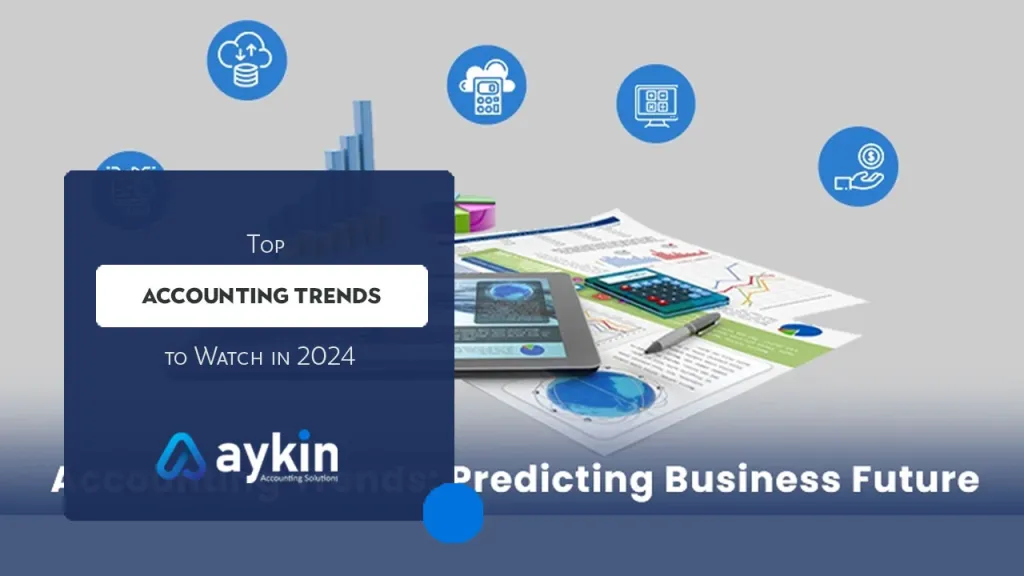Top Accounting Trends to Watch in 2024

The accounting industry is constantly evolving, driven by technological advancements, regulatory changes, and shifting business landscapes. As we move into 2024, several key trends are poised to shape the future of accounting. Staying informed about these trends can help businesses and accounting professionals adapt and thrive in an ever-changing environment. Here are the top accounting trends to watch in 2024.
1. Automation and Artificial Intelligence (AI)
Embracing Automation
Automation continues to revolutionize the accounting industry, streamlining processes and reducing the need for manual intervention. In 2024, more businesses will adopt automated accounting solutions to handle repetitive tasks such as data entry, invoicing, and reconciliation. This not only increases efficiency but also minimizes errors.
The Rise of AI
Artificial Intelligence is becoming a game-changer in accounting. AI-powered tools can analyze vast amounts of data, identify patterns, and provide insights that were previously unimaginable. From predictive analytics to fraud detection, AI is enabling accountants to make more informed decisions and offer strategic advice to their clients.
2. Blockchain Technology

Enhancing Security and Transparency
Blockchain technology is making significant inroads into the accounting sector. Its decentralized nature ensures that financial transactions are secure, transparent, and immutable. In 2024, more firms will leverage blockchain to enhance their auditing processes, reduce fraud, and improve traceability.
Smart Contracts
Smart contracts, powered by blockchain, are gaining traction. These self-executing contracts with predefined rules can automate various financial transactions and compliance processes, reducing the need for intermediaries and increasing operational efficiency.
3. Cloud Accounting
Real-Time Financial Data
Cloud accounting continues to be a major trend, offering businesses real-time access to financial data from anywhere in the world. This accessibility allows for better decision-making and collaboration among team members. In 2024, we will see an increased adoption of cloud-based accounting solutions, especially among small and medium-sized enterprises (SMEs).
Scalability and Cost Savings
Cloud accounting platforms offer scalability, allowing businesses to pay only for the services they need. This cost-effective approach is particularly beneficial for growing businesses that require flexible accounting solutions.
4. Data Analytics and Business Intelligence
Leveraging Data for Insights
Data analytics is transforming the accounting profession by providing deeper insights into financial performance. In 2024, more accountants will use advanced analytics tools to identify trends, forecast future financial outcomes, and make data-driven decisions.
Business Intelligence Tools
Business intelligence (BI) tools are becoming essential for accountants. These tools integrate data from various sources, providing comprehensive dashboards and reports that help businesses monitor their financial health and identify areas for improvement.
5. Regulatory Changes and Compliance
Adapting to New Regulations
Regulatory changes continue to impact the accounting landscape. In 2024, businesses will need to stay abreast of new regulations and compliance requirements, particularly those related to data privacy, tax laws, and financial reporting standards.
Emphasis on ESG Reporting
Environmental, Social, and Governance (ESG) reporting is gaining importance. Stakeholders are increasingly demanding transparency in how businesses address ESG factors. Accountants will play a crucial role in helping companies develop and report on their ESG strategies.
6. Remote Work and Virtual Collaboration
Adapting to a Hybrid Workforce
The shift to remote work, accelerated by the pandemic, is here to stay. Accounting firms are adopting hybrid work models, combining remote and in-office work. In 2024, we will see an increased focus on virtual collaboration tools to facilitate communication and teamwork among dispersed teams.
Cybersecurity Concerns
With the rise of remote work, cybersecurity has become a top priority. Accounting firms must invest in robust cybersecurity measures to protect sensitive financial data from cyber threats.
Conclusion
As we look ahead to 2024, the accounting industry is set to undergo significant transformations. Embracing automation, AI, blockchain, cloud accounting, data analytics, and adapting to regulatory changes will be crucial for businesses and accounting professionals. By staying informed about these trends, companies can position themselves for success in an increasingly complex and dynamic financial landscape.
Staying ahead of these trends will not only enhance operational efficiency but also provide a competitive edge in the market. The future of accounting is bright, with technology and innovation leading the way toward more accurate, transparent, and insightful financial management.



